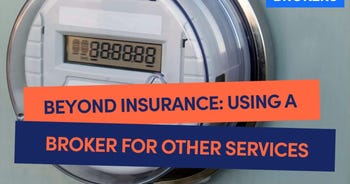Do you need insurance for your side hustle?
43% of people in the UK in 2024 are making extra income thanks to a side hustle — on average, they’re earning around £900 a month!
And while making a little extra money is great for your back pocket, what happens if something goes wrong? Unlike most businesses, side hustles don’t legally need cover if it's only you earning, but they can be a lifesaver in times of crisis.
Find out everything there is to know about insurance for your side hustles with this guide.

What is a side hustle?
A side hustle is essentially a venture outside of your main job that earns extra income. This could be anything from selling homemade goods on Etsy to freelance work or even providing consulting services in your area of expertise.
The beauty of a side hustle is its flexibility and potential to grow into something more substantial over time.
Is a side hustle considered a business?
The question of whether a side hustle is considered a business is a common one, especially for people who begin on a smaller scale, like in their homes on the weekends or during the evening after their regular day job.
But if your side hustle generates regular income from consistent business activities, it’s generally considered a business. For example, if you’re selling handmade jewellery, and you do this regularly to make a profit, you’re running a business.
In the eyes of HMRC, the difference between a job and a side hustle is how much you earn. Earnings of less than £1,000 in one tax year are not considered taxable income. So, you won’t need to register as self-employed or declare any of these earnings to HMRC.
Why do side hustles need insurance?
Taking on a side hustle can be an exciting adventure, offering you the chance and opportunity to explore your passions and boost your income.
But with this entrepreneurial spirit comes the need to protect your efforts, and while insurance might not be the first thing on your mind when you’re just starting out, it’s still essential to organise.
Let’s dive into why securing insurance for a side hustle is a smart idea:
- Protection against liability - Think of liability insurance as a safety net for your side hustle. Imagine you’re a freelance photographer and, during a shoot, someone trips over your equipment and breaks their arm. Without liability insurance, you could be held personally responsible for legal fees and any potential medical, rehabilitation, or therapy costs.
- Asset protection - Whether you’re a graphic designer relying on expensive software and hardware or a tradesman with physical tools and materials, your side hustle likely involves costly assets. Insurance helps protect these goods against risks like theft, fire or accidental damage. This means if something unexpected happens, you’re not left scrambling to replace essential items out of pocket.
- Professional credibility - Having insurance can set you apart as a professional. Clients and customers often feel more secure working with someone who has insurance, as it demonstrates a professional commitment to quality and responsibility. For example, if you’re a freelance consultant, you may want to consider getting professional indemnity insurance as it can reassure clients that they’re covered in case of any advice that leads to financial loss.
- Contractual requirements - Sometimes, having insurance isn’t just a bright idea — it’s a requirement. Many clients, especially larger companies, may require proof of insurance before they agree to work with you. You’ll see this most of the time in fields like consultancy, construction or even event planning! Having the right insurance in place can potentially open doors to opportunities that might otherwise be out of reach.
- Financial stability - Running a side hustle comes with financial risks, and unexpected incidents can lead to significant expenses coming straight out of your pocket. Having the proper insurance in place helps you manage these risks without derailing your side hustle. Whether it’s a client lawsuit, damaged equipment or a product issue, insurance helps cover costs and ensures your side hustle remains viable even in tough times.
- Home and renters insurance doesn't provide adequate cover - A common misconception is that home or renters insurance will cover side hustle activities, but most standard policies exclude business-related activities. This means if you’re running a home-based bakery or a nail salon from your dining room, you’re likely not covered for business-related losses or liabilities.
How do you know if you need insurance for a side hustle?
Determining whether you need insurance for a side hustle can seem tricky at first, but it’s all about understanding the risks involved with your side hustle. It’s important to:
Assess your side hustle activities
Take a close look at what your side hustle involves. Are you providing a service, selling products or even hosting an event? Each type of activity comes with its own set of risks.
For example, if you’re selling homemade candles, product liability insurance can be invaluable in case someone claims your product caused damage. Or if you’re a dance teacher, public liability insurance will cover your back in case someone gets injured during your class and claims against you.
Interaction with the public
Do you interact with clients or customers face-to-face? If so, public liability could be a good idea. This type of insurance covers claims for injury or property damage that might occur during your business operations.
If you’re a personal trainer and a client gets injured during a session, this insurance would cover any of the associated costs, protecting you from hefty out-of-pocket expenses.
Use of equipment and tools
Consider which tools and equipment are essential to your side hustle. Whether it’s a laptop for your freelance writing gig or power tools for a carpentry business, these items are crucial for your operations.
Insurance can cover repairs or replacements if your equipment is stolen or damaged, ensuring you can keep your business running smoothly without unexpected financial strain.
What insurance do you need for a side hustle?
It’s important to think about the type of insurance your side hustle needs, but at a basic level, there are three coverage options that can help keep your business safe.
Professional indemnity insurance
Professional indemnity insurance is essential if your side hustle involves providing advice or professional services. This insurance option covers you against claims of negligence, mistakes or omissions that could lead to a client suffering financial loss.
Who needs professional indemnity insurance?
- Freelance consultants offering business or financial advice
- Graphic designers and web developers creating custom projects for clients
- Writers, editors and content creators providing specialised content
Why is it important?
Imagine you’re a freelance consultant, and a client claims your advice led to a financial setback within their business. Professional indemnity insurance covers legal costs and compensation, protecting you from potentially crippling expenses that your side hustle simply can’t afford.
Public liability insurance
Public liability insurance is crucial if your side hustle involves interacting with the public, clients or customers in person. It aims to protect you from claims related to injury or property damage caused by your business activities.
Who needs public liability insurance?
- Personal trainers and fitness instructors working with clients
- Photographers and videographers shooting on location
- Event planners coordinating various functions
Why is it important?
Imagine you’re an event planner organising a corporate event. During the event, a guest accidentally trips over a cable you set up, falls and gets injured. Public liability would cover the medical costs and any legal claims, protecting you from the financial impact of the incident and helping maintain your professional reputation.
Product liability insurance
If your side hustle involves selling products, then product liability insurance is vital. This insurance protects your side hustle against claims that your product has caused injury, illness or damage to property.
Who needs it?
- Homemade beauty product sellers on platforms like Etsy
- Bakers and caterers providing food items
- Craftspeople creating and selling homemade goods
Why is it important?
Imagine you sell artisanal soaps online, and a customer claims that your product caused a skin reaction. Product liability insurance would cover the costs of legal defence and compensation, allowing you to continue your business, without worry.
Cyber insurance
Cyber insurance is essential for your side hustle if you store sensitive customer data or online operations. This type of insurance helps protect your business from the financial fallout of cyberattacks, data breaches and other digital threats.
Who needs it?
- Freelance digital marketers and writers managing client data
- E-commerce store owners selling products online
- Social media managers with access to client accounts
Why is it important?
Imagine you run an online store, and a hacker gains access to your customer database, stealing personal and payment information. Cyber insurance would cover the costs of notifying any affected customers, managing the fallout and restoring your security systems. It can also help with any legal fees or potential fines your business could face.
Do you have to pay tax on side hustle earnings?
In the UK, you must pay tax on any income above £1,000 earned from self-employment or a side hustle. This is known as the Trading Allowance, and it’s a helpful buffer for those just starting out. If your earnings stay below this threshold, you don’t need to report them to HMRC.
However, once you exceed £1,000 in a tax year, you must declare your earnings and register as self-employed with HMRC. This process is relatively simple and can be easily done online. Once registered, you can submit a self-assessment tax return each year detailing your income and expenses.
Do you need insurance even if your side hustle is small?
Absolutely — even small side hustles face risks! In the grand scheme of things, the cost of insurance is often minimal compared to the protection and peace of mind it offers.
How much does insurance cost for a side hustle?
It’s hard to pinpoint an exact cost for side hustle insurance as there’s a wide range of factors that go into tailoring a policy, such as:
- The type of cover you need
- The size of your side hustle
- Your location
- The industry you’re operating in
- Your claims history
It’s best to get in touch with one of our knowledgeable insurance team, and they can help you set up the right business insurance to keep your side hustle running.
Does home insurance cover home-based side hustles?
Unfortunately, most home insurance policies won’t cover the extent of any side business — this even goes if you’re working from home, too!
It’s best to check the wording of your policy to see exactly what it entails.
Get your side hustle on its feet with Bionic
From safeguarding against the unknown to protecting your assets, there’s a wide range of insurance options to arrange when it comes to your side hustle.
At Bionic, we celebrate and champion UK business owners and want to help in every way we can. That’s why we use a team of knowledgeable insurance brokers who work with a panel of trusted insurers to find you the right cover.
Start a quote with us today or head over to our business insurance guides to find everything there is to know about sorting insurance for your business.








